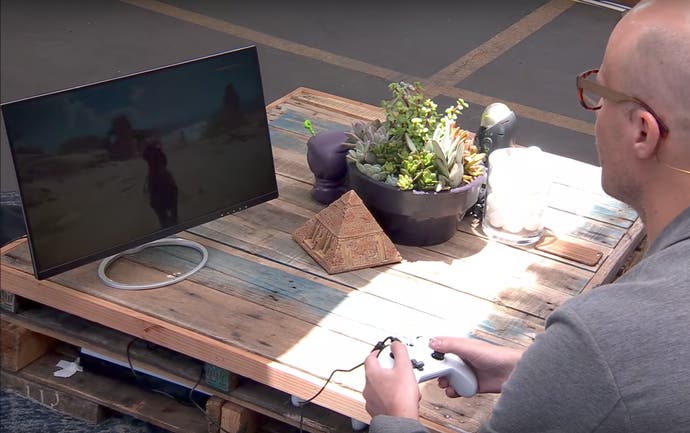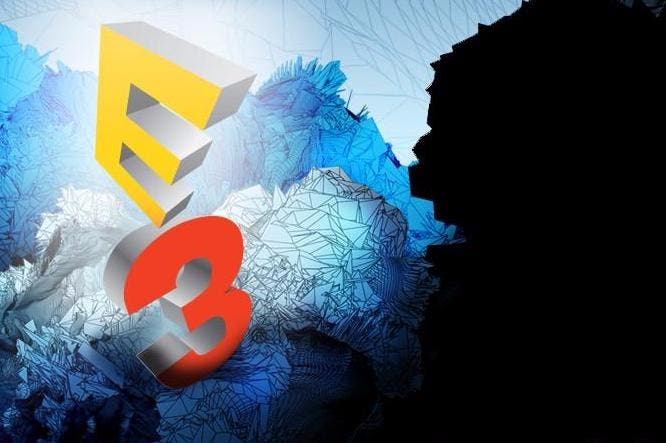E3's press conferences are killing E3
There just aren't enough games to go around.
That E3 is suffering an identity crisis is nothing new. The video game industry's yearly jamboree has faced accusations of declining relevance for a few years now. The ascent of Steam, esports, the indie scene and online PC gaming have barely been reflected at all at a show that can't escape the slowly withering grasp of retail. Meanwhile, publishers have found it easier to communicate with gamers on their own social platforms, and through influencer surrogates on YouTube and Twitch, than by participating in the hucksterish competition for the attention of the world's press at E3.
Big publishers have turned their backs on the E3 show floor, and - in EA's case - set up their own satellite events. Even for those that remain, the increasing importance of the livestreams that beam exciting new game footage direct into homes worldwide have left some stands as a vestigial presence, with huge screens showing trailers and demos on repeat, and often a distinct lack of playable video games. It got so bad that, last year, PRs were asking me if Eurogamer would continue to bother with E3 in the future. (I said we would, but more on that later.)
It used to be that E3 was packed into a day and a half of press conferences and two and a half days of frantic news-gathering on the show floor. Over the past three or four years, the focus has shifted from the show itself to a warm-up period of streams, press previews and showcases dotted all over Los Angeles (or just on the internet) that has now ballooned to a marathon 72 hours. When you arrive at the LA Convention Center on Tuesday afternoon for E3 proper, your appointment book is, of course, still full to bursting of games to see and people to meet - and it's hard to imagine it ever being otherwise - but it feels strangely like mopping up. It feels as if the main event is over, even though the actual main event has just begun.
That all of this represents an existential threat to E3 has been acknowledged by the event's organiser, US trade body the Entertainment Software Association, in its move to admit the public to the show floor this year to amp up the buzz. And yet, up to now I still found it hard to agree with the doomsayers that forecast the show's death. The momentum behind an annual gathering of the entire industry in one place just seemed unstoppable, and the obvious benefits of a shared moment in the spotlight too large. Conventions exist in every industry for a reason, and even video games haven't yet sublimated themselves so completely into cyberspace that they can discard the unexpected connections and sheer emotional charge of a face-to-face meeting.
But this year, my confidence in E3 is shaken for a much simpler reason. The press conferences - or the live events they have morphed into - are out of control, and there just aren't enough big games to go around any more.
As the amount of time and prominence given over to pre-show hype reels has increased, the content available for them has decreased - if we're thinking of content as new reveals of major console video games, which we are, because this is E3. The result is a series of flat showings that would sap the excitement of show attendees and viewers at home even if they weren't spread out over three long days. EA hung its hat on a half-hour-long shoutcasted multiplayer match between YouTubers. Bethesda gathered everyone together at enormous expense for two or three new trailers, seemingly just because having your own event is the done thing. Microsoft, to its credit, assembled an enormous list of games for its briefing - but had to borrow most of its firepower, scrape a few barrels and offer constant caveats about exclusivity. Sony relied heavily on bringing back games it had shown for the first time last year, if not the year before.
There are a couple of reasons for this. One is what's happening to triple-A video game development. The market's not contracting, but as costs and development team sizes balloon, the number of big games is. Most of the publishers we are talking about - your EAs, your Activisions - release far fewer games annually than they used to. They are focused on one or two massive launches per year, plus a few hardy perennials. There just isn't as much new product to hype.
In the context of E3, and its traditional focus on the 'big three' console platform holders, the problem is exacerbated right now by Microsoft's apparent (and hopefully temporary) retreat from first-party development. Forza Motorsport 7 is the only new big-budget Microsoft Game Studios production unveiled this year. So Microsoft had to borrow its third-party partners' big reveals to bolster its own showing: EA and BioWare's ambitious Destiny rival, Anthem, and the latest Assassin's Creed. This led to the faintly ridiculous spectacle of EA revealing its massive new property with a mere a seconds-long teaser at its own show, and the full-blown farce of Assassin's Creed Origins' appearance at the Ubisoft conference (the only gameplay we saw was shot over the shoulder, on a monitor washed out by the Californian sun). Even if Xbox bounces back with a bulging slate in future, this situation has effectively highlighted the current problem. There are only a small handful of major game announcements to be had at E3 in any given year, and if somebody stumbles, everybody suffers.

Sony's issue is different, even if the end result is the same. There's no doubting its heavy investment in first-party game production, but it also has its own event, the PlayStation Experience in December, to feed with announcements. That event, last year, was the venue for our first look at Uncharted: The Lost Legacy and The Last of Us 2. When it came to E3, there was precious little left in the tank.
Many publishers have realised that there is very little signal amplification to be lost, and a great deal of control and airtime to be gained, by simply making their announcements elsewhere, on their own schedules, with their own streams. Nintendo prefers to drip-feed announcements through Nintendo Direct videos at its own pace. Activision revealed Destiny 2 weeks ago, at its own event, and enjoyed the luxury of having enough time to go into the detail the Destiny community craves. It did the same with Call of Duty: WW2 a few weeks previously, so the two biggest console games of the year were old news by the time E3 rolled around - and it's hard to argue this wasn't the right call.
Ubisoft was the one publisher to keep its powder dry. Yes, it suffered its usual leaks, but its show featured a fistful of genuine surprises. The French firm's charm and humanity were certainly winning, but it was also the best-received E3 press conference because it traded in exactly what the E3 audience wants: big, surprising, exciting curtain-raisers.
But wanting this doesn't mean we can have it for three back-to-back days every year. It's just not sustainable - not while publishers are trying to have their cake and eat it, spreading the hype across embargoed teasers, their own channels and reveal events, and the ever-expanding amount of stage time at the old E3 circus. We notice, we get bored, and we decide that this hasn't been a great E3 before the doors are even open and before anyone has played the games - because we've been conditioned to pay more attention to these sideshows.
The blame doesn't lie entirely with publishers. The show organisers and we in the media have been complicit in making E3 all about major new game reveals for many years now. They have been firmly established as the show's currency, but deflation is now out of control. For the first time this year it feels like the centre cannot hold. Too much noise, not enough signal. It's dull.
If PRs ask me the same question about our future attendance at E3 this year, I'll still give them the same answer. We will keep the majority of our staff in the UK, because (painful time difference aside) it's easier to cover all the online announcements from home. But we will send a crew out to LA for as long as there is game code to see, and as long as there are game-makers to interview. We are reporters, and in reporting, nothing beats first-hand contact. Not ever.
I don't want to lose that. I don't want E3 to die. I see a lot of value in assembling the industry, the press and the audience for a communal celebration of games at a singular time and place. It sharpens us all professionally, and lifts us all personally, to step out of our bubbles, talk to each other, and talk across audiences rather than just to preaching to the faithful. That's the real value of an event like E3.
But if we're going to retain that value, we - and by we I mean the wider E3 community, which is everybody: the ESA, the publishers, devs, you guys in the audience, and we in the media - need to be prepared to redefine what E3 is about. If it's no longer the best place to announce new games, so be it, but it needs to let go of those press conferences and recreate itself as something else. The best place to actually talk about new games, perhaps? The best place to play them? A man can dream. But it's definitely time for a change.



